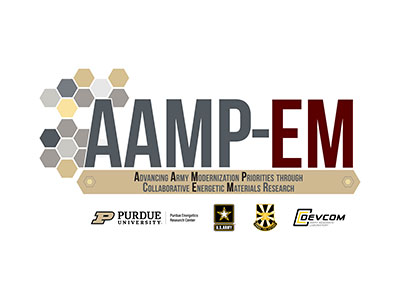Programs
The Purdue Institute for National Security (PINS) promotes collaboration and innovation to address national security challenges. PINS manages several Collaborative Programs that embrace the collaborative mindset to further innovative research.
AFRL Regional Hub Network – Midwest
The Air Force Research Laboratory (AFRL) Regional Hub Network assembles a new science and technology ecosystem with universities, large and small businesses, other government agencies, and venture capitalists in which partners help the lab explore cutting-edge technology advancements.
Purdue serves as the lead and headquarters for the AFRL Regional Hub Network – Midwest. The Midwest Hub Network includes more than 60 academic and industrial partners from across 12 states in the region.


HAMTC
Powered by PARI, the Hypersonics Advanced Manufacturing Technology Center (HAMTC) is a single location at Purdue for industry partners to work on materials and manufacturing innovations. It provides access to testing capabilities at Purdue that would enable the United States to overtake near-peer adversaries in the field.
HAMTC is the only vertically integrated center in the nation that enables the design, manufacturing, joining and testing of hypersonic components and subsystems in one location. This reduces the time and cost necessary for prototype development, provides innovations through academic engagement and transitions these technologies to the defense industrial base.
Defense Civilian Training Corps
The Defense Civilian Training Corps (DCTC) is a new Purdue program that encourages students to pursue nonmilitary careers in the Defense Department. Open to rising juniors, DCTC pays 100% of tuition and fees, plus a monthly stipend. Currently, there is no service commitment. Students receive early job placement, guidance on security clearances, leadership training and more. DCTC welcomes students in a wide array of subjects — from finance and management to artificial intelligence and machine learning, engineering, public policy and more.


EMBR
EMBR: A Collaborative Center for Energetic Materials Basic Research is a cooperative agreement between a consortium of universities — Purdue, Massachusetts Institute of Technology, University of Maryland, Texas Tech University and University of Notre Dame — and the Army Research Laboratory. EMBR aims to expedite the discovery, design and scale-up of energetic materials and associated munitions concepts. EMBR’s research objectives include exploring new materials and formulations, developing new diagnostics and modeling techniques and educating a new generation of highly capable scientists and engineers to bolster the Defense Department’s technical workforce.
AAMP-EM
The Advancing Army Modernization Priorities – Energetic Materials (AAMP-EM) is a cooperative agreement between the Purdue Energetics Research Center (PERC) and Army Research Laboratory. Research related to energetic materials — explosives, propellants and pyrotechnics — is essential to the Defense Department’s modernization priorities. AAMP-EM responds to this defense need with a comprehensive research agenda that targets every aspect of the U.S. energetic materials enterprise, from synthesizing molecules all the way to manufacturing munitions.

Contact Us
Please contact us at PINS@purdue.edu.
